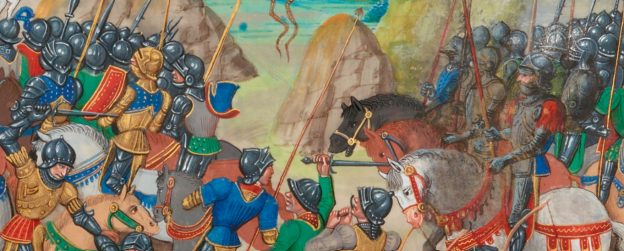Perhaps like me you stayed up late on Saturday night and watched the coronation ceremony. It was at times interesting, at times boring, and at times quaint. The coronation procession afterwards was impressive. Still, it hardly affected our lives, except for a little lost sleep and bleary eyes at Church the next morning!
Saul had been proclaimed king, but everyone went back home to their day jobs and carried on as if nothing had changed. In this passage, Israel enjoys salvation from their enemies, led by a king empowered by God. This act unites the nation in reaffirming their allegiance to their new king. It reminds us that we also fight against foes who wish to destroy, but will gain victory only through our king, Jesus, to whom we should reaffirm our allegiance regularly too.
After Saul’s coronation ceremony, there was no ceremonial flyover and celebration concert. Everyone, including Saul, went home (10:26). Some doubted how Saul would supposedly save Israel as king (10:27). There was no unity of rule and identity in Israel. That was about to change.
Nahash, an Ammonite king, besieged Jabesh-gilead (v.1). There was bad blood between Ammon and Israel. Ammonites were “cousins” descended from Lot with a seedy origin (Gen. 19), and some unsavoury brushes through Israel’s history in Canaan. Not much love lost on either side.
Nahash was busy trying to enslave Israel, possibly with some prior success (described in other historical sources). When Jabesh asked for terms, Nahash demanded to gouge out the right eye of the menfolk, rendering them useless for military service (they fought with interlocked shields covering the left eye) and to disgrace Israel (v.2).
Nahash was so cocky that when Jabesh asked for a week to seek help, he agreed (v.3). Jabesh-gilead needed a saviour.
That saviour was found in Gibeah, where messengers from Jabesh found their way (v.4). The place of vile immoral acts and a civil war, but also linked through family ties (Judges 19-21), became the source of salvation for Israel.
When Saul returned from the fields and heard his townsfolk weeping at the news of Jabesh, “the Spirit of God rushed upon Saul” and he was kindled with righteous anger (vv.5-6). Despite Israel sinfully asking for a king, and despite Saul being the type of king more in keeping with worldly fashion, God still used Saul to save.
Saul called together Israel, threatening punishment on the oxen of anyone who refused the summons (v.7). He mustered the significant gathered army from Israel and Judah (v.8), and informed Jabesh-gilead they would be saved (v.9).
The men of Jabesh set the trap, offering to hand themselves over to Nahash the following day (v.10). Success, the Ammonites thought, and let down their guard.
When Saul and his army arrived the next day, ordered into three lines of battle, “they came into the midst of the camp in the morning watch and struck down the Ammonites until the heat of the day. And those who survived were scattered, so that no two of them were left together” (v.11).
Salvation had come to Israel! Could this Saul save God’s People (10:27)? Empowered by God, the answer was it seemed so!
Success has a thousand fathers, and suddenly everyone was pro-Saul. Eager to prove their allegiance, they sought out the nay-sayers to put them to death (v.12). But victory is no time for vengeance, not for those led by God anyway. Saul sought unity, proclaiming that none should die on a day when God had saved Israel (v.13).
Instead, Samuel suggested, and the people eagerly agreed, to reaffirm their allegiance to Saul as king at Gilgal (v.14), tieing God’s faithfulness then to his past faithfulness (Josh. 4). There they did so, sacrificing to God and rejoicing in God’s salvation and the leadership he provided them (v.15).
Like Israel, we also face a sometimes hostile world which seeks to render us ineffective for God’s service, whether through compromise, sin, or destruction. Though it might be felt on the physical plane, this battle is really a spiritual one (Eph. 6:12). Though we may not like to fight, sometimes the fight comes to us. We should not be surprised or despair when it does.
Instead we should put on our armour and resist. Yet in doing so, we must remember that our spiritual armour comes from God (Eph 6:12-18), and that we will only win when we are led by God, through our own king and Saviour Jesus Christ.
It is only as part of Jesus’ army, organised and led by God’s anointed king, that we can ultimately resist and prevail against our foes. Only Jesus, empowered by the Spirit of God (Mark 1:10) and himself God who became man (John 1:14), is able to overcome our foes because he has already overcome the world (John 16:33).
In King Jesus we can take heart, and reaffirm our allegiance to the Saviour God has given us, to lead us to victory over sin.


